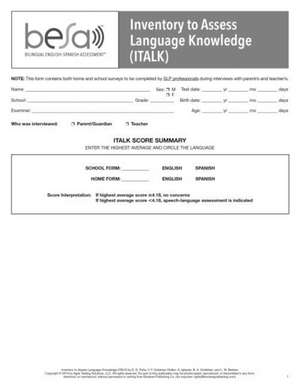Inventory to Assess Language Knowledge (Italk)
Autor Elizabeth D Pena, Vera F Gutierrez-Clellen, Aquiles Iglesias, Brian A Goldstein, Lisa Bedoreen Limba Engleză Paperback – 13 iun 2018
DESCRIPTION OF BESA COMPONENTS AND SUBTESTS
The BESA is a comprehensive assessment of a child's speech and language abilities in English and Spanish. Two ancillary questionnaires (BIOS and ITALK) can be used to document language exposure and use, allowing the examiner to develop a profile of any parent and teacher concerns. BESA subtests address the domains of phonology, morphosyntax, and semantics separately for both Spanish and English. There are three standardized and norm-referenced subtests addressing language ability, and one criterion-referenced activity allowing observation of pragmatic language. Administration time varies depending on whether or not both languages are tested and which subtests are included. Administration takes between one hour (for one language) and two hours (for both languages).
Bilingual Input-Output Survey (BIOS)
The BIOS is typically completed as part of an interview by the examiner. In this survey, parents are asked about the language exposure history of the child. This information helps the examiner know when and in what context each of the child's two languages were used on a year-to-year basis. In addition, parents and teachers are asked what language the child hears and uses during a typical school day, and during a typical weekend day on an hour-by-hour basis. This information provides clinicians with information about relative use and exposure to each language and can help guide whether to test children in Spanish, English, or both. The parent survey (BIOS-Home) takes 10 to 15 minutes to complete; the teacher survey (BIOS-School) can be completed in 5 to 10 minutes.
Inventory to Assess Language Knowledge (ITALK)
The ITALK is completed by the examiner as a parent and teacher interview. The ITALK items address relative use of a child's two languages and five areas of speech and language development in Spanish and English (vocabulary, grammar, sentence production, comprehension, and phonology). Parents and teachers are asked to identify the perceived level of the child's performance in each language. This inventory provides a brief indicator of relative language use. It also provides a description of parent and teacher concern and can be used to guide development of the assessment strategy. Results of the inventory can be used to interpret diagnostic results from BESA or other language tests. The ITALK can be completed in 10 minutes or less.
BESA Pragmatics Activity
The Pragmatics activity is based on Fey's (1986) model of assertiveness and responsiveness. In an interactive format, children are asked to "help wrap a present" with the examiner. Through this realistic situation, obligatory contexts are set up to elicit different assertive and responsive acts. The Pragmatics activity utilizes English, Spanish, or both languages together (via code-switching) depending on the child's preferred language of interaction. The activity should be used to identify children who may encounter difficulties in situations that require the children to be active participants (e.g., classroom). If administered at the beginning of a battery of tests, the Pragmatics activity provides an excellent opportunity to establish rapport with the child and will also provide clinicians with an indication of how collaborative and interactive the child will be during the rest of the assessment. This activity takes 5-10 minutes to complete.
BESA Phonology Subtest
The Phonology subtest is a single-word phonological assessment designed primarily to differentially diagnose typical from atypical phonological skills in Spanish-English bilingual children. Analyses are also included that allow the examiner to profile the phonological skills in these children. The assessment includes two measures. The Spanish measure assesses phonological production using 28 Spanish words. The English measure assesses phonological production using 31 English words. The Phonology subtest takes 10 to 15 minutes to administer in each language, depending on the individual child (20 to 30 minutes total).
BESA Morphosyntax Subtest
The Morphosyntax subtest employs cloze and sentence repetition tasks to target grammatical morphemes and sentence structures that were predicted to be difficult for children with language impairment in English or Spanish.
Forms tested in English include plural -s, possessive -s, past and present tense, third-person singular, progressives, copulas, auxiliary do + negatives, and passives, as well as complex verb forms, conjunctions, and embedded prepositions and noun phrases. The English Morphosyntax Subtest has 24 cloze items and 9 sentence repetitions items.
Forms tested in Spanish include articles, progressives, clitics, subjunctives, preterite, complex verb forms, and conjunctions. The Spanish Morphosyntax Subtest has 15 cloze items and 10 sentence repetitions items.
For each language, a grammatical cloze subscore, a sentence repetition subscore, and a total score that is a composite of those two are derived. The morphosyntax test takes approximately 15 minutes to administer in each language (30 minutes total).
BESA Semantics Subtest
The Semantics subtest targets six tasks: analogies, characteristic properties, categorization, functions, linguistic concepts, and similarities and differences. These six item types were based on the literature describing acquisition of semantic breadth and depth in order to tap into how c
Preț: 321.81 lei
Nou
Puncte Express: 483
Preț estimativ în valută:
61.58€ • 64.46$ • 50.95£
61.58€ • 64.46$ • 50.95£
Carte indisponibilă temporar
Doresc să fiu notificat când acest titlu va fi disponibil:
Se trimite...
Preluare comenzi: 021 569.72.76
Specificații
ISBN-13: 9781681252858
ISBN-10: 1681252856
Pagini: 8
Dimensiuni: 279 x 216 mm
Greutate: 0.36 kg
Ediția:Bilingvă
Editura: Brookes Publishing Company
ISBN-10: 1681252856
Pagini: 8
Dimensiuni: 279 x 216 mm
Greutate: 0.36 kg
Ediția:Bilingvă
Editura: Brookes Publishing Company
Descriere
The Bilingual English-Spanish Assessment was developed in response to the need for valid, reliable instruments for assessment of speech and language ability, along a continuum, in English-Spanish bilingual children ages 4 through 6 years. It provides a comprehensive assessment of a child's speech and language abilities in English and Spanish.
